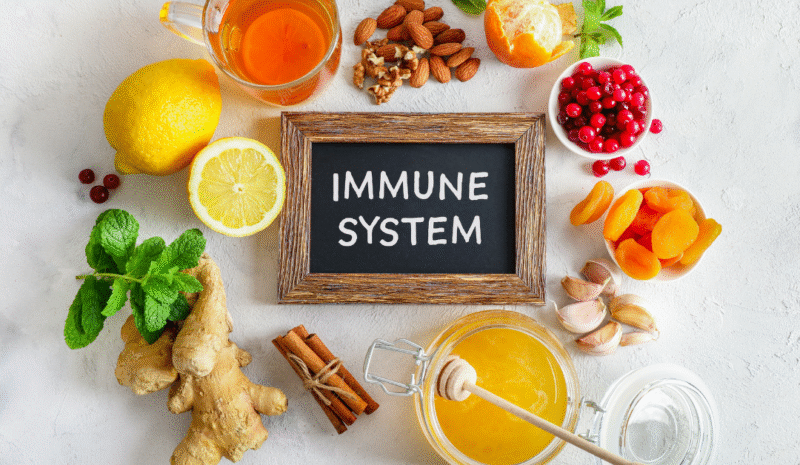Introduction
A strong immune system is your body’s first line of defense against harmful invaders like bacteria, viruses, and other pathogens. It plays a crucial role in maintaining overall health and fighting infections. However, with the increasing demands of daily life, poor eating habits, and environmental factors, your immune system can become compromised over time.
The good news is that there are many natural ways to boost your immune system, making it more effective at protecting you from illness. In this article, we’ll explore 7 proven ways to strengthen your immune system naturally and improve your overall well-being. By adopting a few healthy habits, you can give your immune system the support it needs to function optimally.
Internal Link: For more on eating healthy, read our article on “Superfoods for Heart Health.”
1. Eat a Nutrient-Rich Diet
How Diet Affects Your Immune System
Your diet plays a significant role in the health of your immune system. The foods you consume provide the essential nutrients that support the production and function of immune cells. A well-balanced diet that includes a variety of vitamins, minerals, and antioxidants is crucial for immune health.
Foods to Include in Your Diet for Immune Support
To boost your immune system naturally, make sure to eat a variety of fruits, vegetables, lean proteins, and whole grains. Some key nutrients to focus on include:
- Vitamin C: Found in citrus fruits, strawberries, and bell peppers, vitamin C is essential for the production of white blood cells that fight infection.
- Vitamin E: Found in nuts, seeds, and spinach, vitamin E helps protect your cells from oxidative stress and boosts immune function.
- Zinc: Found in meat, legumes, and seeds, zinc is important for the development and function of immune cells.
2. Stay Hydrated
Why Hydration is Essential for Immunity
Water is essential for almost every bodily function, including immune system health. Staying hydrated helps your body produce lymph, which is essential for removing toxins and waste products. When you’re dehydrated, your immune system may not function as efficiently, leaving you more vulnerable to illness.
How Much Water Should You Drink?
Aim for at least 8 glasses (about 2 liters) of water per day, but this can vary depending on factors like activity level, weather, and individual needs. You can also include hydrating foods like cucumbers, watermelon, and soups to help meet your hydration goals.
3. Get Regular Exercise
How Exercise Boosts the Immune System
Exercise is not only good for your body but also plays a key role in maintaining a healthy immune system. Regular physical activity helps increase blood circulation, which allows immune cells to travel more efficiently throughout the body. It also promotes the production of certain hormones and proteins that support immune function.
How Much Exercise is Needed?
To see the benefits of exercise on your immune system, aim for at least 30 minutes of moderate exercise most days of the week. This can include activities like walking, running, swimming, or even yoga. Avoid overtraining, as excessive exercise can have a negative effect on immune function.
4. Manage Stress Effectively
The Connection Between Stress and Immunity
Chronic stress can have a negative impact on your immune system. When you’re stressed, your body produces cortisol, a hormone that can suppress immune function over time. High cortisol levels can also increase inflammation in the body, making you more susceptible to illness.
Stress Management Tips
To reduce stress, incorporate relaxation techniques such as meditation, deep breathing exercises, or journaling into your daily routine. Additionally, try to prioritize activities that bring you joy and relaxation, such as spending time with loved ones, engaging in hobbies, or going for a walk in nature.
5. Get Enough Sleep
The Importance of Sleep for Immune Function
Sleep is essential for maintaining a healthy immune system. During sleep, your body repairs cells, produces immune cells, and strengthens the immune system. Lack of sleep can impair the function of your immune cells and make you more susceptible to infections.
How Much Sleep Do You Need?
Aim for 7-9 hours of quality sleep each night. Make sure your sleep environment is conducive to rest by keeping your bedroom cool, dark, and quiet. If you have trouble falling asleep, try incorporating a calming bedtime routine, such as reading or practicing gentle stretches.
6. Support Your Gut Health
Why Gut Health Matters for Immunity
Did you know that a significant portion of your immune system is located in your gut? The gut plays a key role in immune function by harboring beneficial bacteria that help protect against harmful pathogens. A balanced gut microbiome is essential for maintaining a strong immune system.
How to Support Gut Health
To support your gut health, focus on eating foods that promote a healthy microbiome, such as:
- Probiotics: Found in fermented foods like yogurt, kefir, sauerkraut, and kimchi, probiotics help increase the number of beneficial bacteria in your gut.
- Prebiotics: Found in fiber-rich foods like garlic, onions, bananas, and asparagus, prebiotics feed the good bacteria in your gut and help them thrive.
- Limit processed foods: Processed and sugary foods can negatively affect the balance of your gut microbiome and contribute to inflammation.
7. Stay Active in Social Relationships
How Social Connections Impact Immunity
Having strong social relationships can positively influence your immune system. Socializing with friends, family, and loved ones can reduce stress, increase feelings of happiness, and boost overall mental well-being. Strong social connections are essential for emotional support, which can help prevent chronic stress and improve immune health.
How to Cultivate Strong Social Bonds
Make time to nurture meaningful relationships by spending quality time with loved ones, participating in group activities, or joining a community organization. Engaging in conversations, expressing emotions, and being supportive of others can help strengthen your immune system and improve your mental health.
Conclusion
Boosting your immune system naturally doesn’t require drastic changes to your lifestyle. By incorporating simple, healthy habits such as eating a nutrient-rich diet, staying hydrated, exercising regularly, managing stress, and getting enough sleep, you can enhance your body’s ability to fight infections and maintain overall health. Don’t forget that your gut health and social connections also play a vital role in strengthening immunity.
If you’re looking for more ways to improve your heart health, be sure to check out our article on Superfoods for Heart Health for additional tips on how to live a healthier life.


